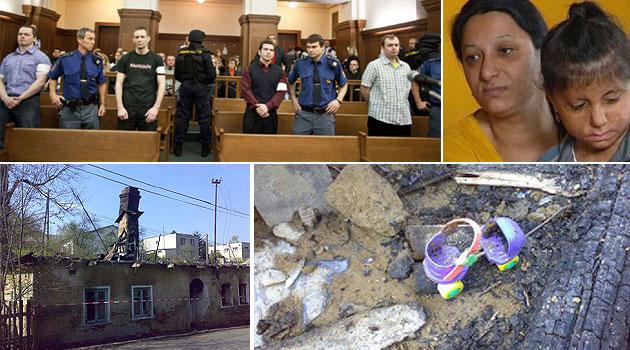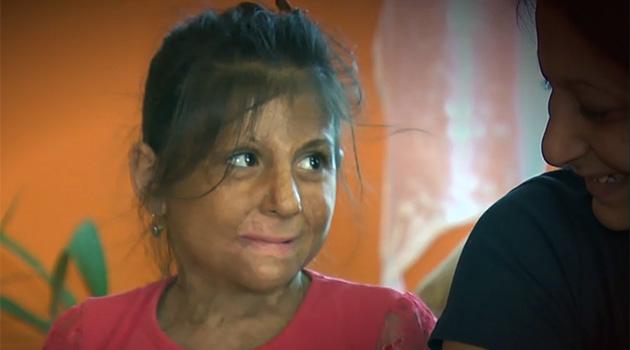Czech Republic: 10th anniversary of arson attack against Romani family by ultra-right

Ten years ago today, during the late night hours of 18 April and the early morning hours of 19 April 2009, a small group of extreme-right sympathizers in Moravia used Molotov cocktails to attack house number 58 in the town of Vítkov (Opava district) where a Romani family were living. Their youngest daughter, Natálka, who was not yet two years old at the time, suffered serious burns as a consequence of the blaze.
The father and mother of the family suffered both physical and psychological harm as well. Three masked perpetrators each threw a lit Molotov cocktail full of gasoline through the windows of the ground-floor building.
The arsonists then got into a getaway car driven by an accomplice and disappeared. The powerful fire they started almost cost Natálka her life.
At the time of the attack there were eight people inside the home. Little Natálka was the worst off, suffering burns over almost 80 % of her body.
She was taken to hospital in critical condition. Doctors did not release her until eight months later.
Today she must repeatedly undergo operations, she has lost three fingers, and she has suffered other consequences that will continue to impact her for the rest of her life. Her father, Pavel Kudrik, and her mother, Anna Siváková, escaped the burning building with less serious physical injuries, while the others escaped without physical injury but were, of course, traumatized.
The perpetrators of this racially-motivated crime were apprehended by police four months later. A volunteer firefighter from the Opava area who had overheard a telephone call on that fateful day between an acquaintance and somebody who turned out to have been a perpetrator of the arson led detectives to the attackers’ trail.
When the volunteer firefighter learned of the tragedy in Vítkov from the media, he reported the suspicious conversation to the police. The detectives working on the case arrested a dozen extremists in mid-August 2009.
Four of those arrested were eventually charged with racially-motivated attempted murder. Their trial began in May 2010 in Ostrava.
Those charged were Václav Cojocaru, Jaromír Lukeš, Ivo Müller and David Vaculík. According to experts on extremism, all four young men were active neo-Nazis, as was proven by evidence found during house searches.
Vaculík, moreover, repeatedly attended the trial dressed in Thor Steinar brand clothing, which neo-Nazis wear to signal their beliefs. The defendants told the court they had no idea the single-family home was occupied when they set it on fire.
They claimed to have believed it was a place where stolen goods were being held. Defense attorneys asked the court to assess their actions not as attempted murder, but as reckless endangerment or battery.
One defense attorney even indirectly accused the parents of the burned girl of being complicit in her serious injuries because they allegedly did not bring her out of the burning room in time to prevent them. The first-instance verdict was announced on 20 October 2010.
“We are of the opinion that the defendants knew the home was occupied,” the judge said. The court called the event an brutal attack and compared it to Kristallacht, the night in November 1938 during which the Nazis set fire to synagogues and other Jewish targets in Nazi Germany.
According to the verdict, the men had planned to commit the attack as a way of showing their dedication to neo-Nazism because they could not afford the cost of the travel to attend neo-Nazi demonstrations happening in Bohemia on that same day. Lukeš, Müller and Vaculík were sentenced to 22 years in prison.
Their sentences were the longest because they had all previously been convicted of perpetrating violent crimes or promoting Nazism. Cojocaru was sentenced to 20 years.
In his case the court took into consideration the facts that he had no previous criminal record, that he did not contribute to organizing the attack, and that he had joined the others as a last-minute decision. All four appealed.
Their cases were then heard by the High Court in Olomouc, which reduced Müller’s sentence to 20 years in the spring of 2011. The court of appeal did so because Müller had confessed during the investigation and expressed regret.
The other three convicts saw their sentences upheld by the High Court, and their subsequent appeals to the Supreme Court also resulted in the sentences being upheld. In 2014 the Constitutional Court rejected complaints by Lukeš and Vaculík about the sentencing and trial, saying nothing unconstitutional had occurred in the handling of their cases – the judiciary had approached the matter correctly and had made the right decision.
